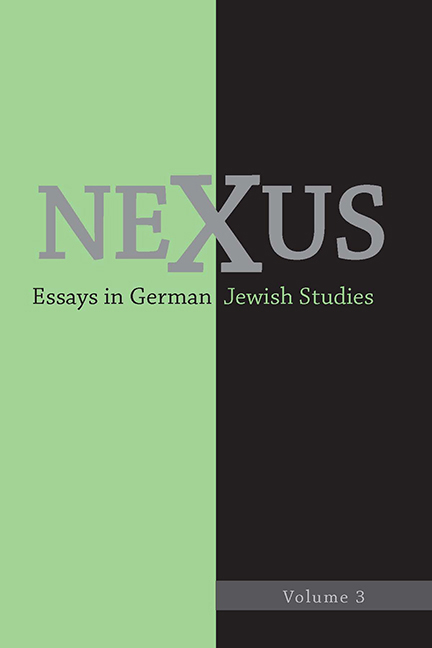Book contents
- Frontmatter
- Dedication
- Contents
- Acknowledgements
- Introduction
- “Ein weites Feld”: Ein Wort zu deutsch-jüdischen Studien anläβlich der Verleihung des ersten Egon Schwarz Prize for the Best Essay in German Jewish Studies
- “An Open Field”: A Word about German Jewish Studies on the Occasion of the Presentation of the first Egon Schwarz Prize for the Best Essay in German Jewish Studies
- Laudatio for Abigail Gillman's Prize-Winning Nexus Essay: “Martin Buber's Message to Postwar Germany”
- Heinrich Heine in Modern German History, by an Eyewitness
- Jeffrey Sammons, Heine, and Me: Some Autobiographical Reflections
- Heine's Disparate Legacies: A Response to Jeffrey Sammons
- My Debt to Heine and Sammons
- Die letzten Tage der Menschheit as a German-Jewish Tragicomedy, and the Challenge to Translators
- Edward Timms's “Die letzten Tage der Menschheit as a German-Jewish Tragicomedy and the Challenge to Translators”: A Response
- Kraus the Mouse? Kafka's Late Reading of Die Fackel and the Vagaries of Literary History
- The Parable of the Rings: Sigmund Freud Reads Lessing
- The Poetics of the Polis: Remarks on the Latency of the Literary in Hannah Arendt's Concept of Public Space
- The Marrano in Modernity: The Case of Karl Gutzkow
- German Jews Dogged by Destiny: Werewolves and Other Were-Canids in the Works of Heinrich Heine and Curt Siodmak
- Authenticity, Distance, and the East German Volksstück: Yiddish in Thomas Christoph Harlan's Ich Selbst und Kein Engel
Authenticity, Distance, and the East German Volksstück: Yiddish in Thomas Christoph Harlan's Ich Selbst und Kein Engel
Published online by Cambridge University Press: 11 May 2017
- Frontmatter
- Dedication
- Contents
- Acknowledgements
- Introduction
- “Ein weites Feld”: Ein Wort zu deutsch-jüdischen Studien anläβlich der Verleihung des ersten Egon Schwarz Prize for the Best Essay in German Jewish Studies
- “An Open Field”: A Word about German Jewish Studies on the Occasion of the Presentation of the first Egon Schwarz Prize for the Best Essay in German Jewish Studies
- Laudatio for Abigail Gillman's Prize-Winning Nexus Essay: “Martin Buber's Message to Postwar Germany”
- Heinrich Heine in Modern German History, by an Eyewitness
- Jeffrey Sammons, Heine, and Me: Some Autobiographical Reflections
- Heine's Disparate Legacies: A Response to Jeffrey Sammons
- My Debt to Heine and Sammons
- Die letzten Tage der Menschheit as a German-Jewish Tragicomedy, and the Challenge to Translators
- Edward Timms's “Die letzten Tage der Menschheit as a German-Jewish Tragicomedy and the Challenge to Translators”: A Response
- Kraus the Mouse? Kafka's Late Reading of Die Fackel and the Vagaries of Literary History
- The Parable of the Rings: Sigmund Freud Reads Lessing
- The Poetics of the Polis: Remarks on the Latency of the Literary in Hannah Arendt's Concept of Public Space
- The Marrano in Modernity: The Case of Karl Gutzkow
- German Jews Dogged by Destiny: Werewolves and Other Were-Canids in the Works of Heinrich Heine and Curt Siodmak
- Authenticity, Distance, and the East German Volksstück: Yiddish in Thomas Christoph Harlan's Ich Selbst und Kein Engel
Summary
Thomas Christoph Harlan's play Ich selbst und kein Engel premiered in West Berlin in 1958, but quickly made headlines in both halves of the divided city. The play, written by the son of the infamous filmmaker Veit Harlan and starring the Argentine riddish-speaking actress Cipe Lincovsky, played a central role in the Cold War struggle over the legacy of both the riddish literary tradition in post-Holocaust Germany and the German Volksstück tradition, especially in the East. This essay uses Harlan's play and the public reaction to its performances to tie political and aesthetic debates on the role of the folk in postwar theater to Cold War attempts by both German states to appropriate distinctly Jewish traditions as their own. Ultimately, the essay argues that a postwar fascination with riddish culture played a much larger role in East German political identity formation than has been previously acknowledged.
AS BOTH GERMAN STATES tried to set up a new theater culture in the years following the end of the Second World War, theater directors and dramaturges had to consider to what extent the German stage could continue to rely on pre-war traditions and to what extent new models needed to be developed. By the late 1950s, the two German states had made “two very different attempts to translate pre-war German theater to the contemporary situation.” While theater directors, writers, and dramaturges in the East were concerned primarily with a specific form of re-education that would help viewers develop class consciousness and a strong identification with a specifically Marxist form of antifascism, Western theater during the first decade and a half of the postwar period tended to stress an ahistorical “essential humanity in its spectators.” Nonetheless, both states laid claim to certain aspects of the German dramatic tradition and strategically disavowed others. Both stressed the fostering of a cultural legacy as a means of signifying the rebirth, on their own respective soil, of a “better Germany,” but also deemed certain aspects of the pre-war theater unsuitable for theirpurposes. Particularly contentious were those forms associated with the Volk.
- Type
- Chapter
- Information
- Nexus 3Essays in German Jewish Studies, pp. 171 - 186Publisher: Boydell & BrewerPrint publication year: 2017



